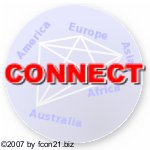Attract International Buyers More Easily
 Why would you want to limit yourself to any national market, if your product could potentially conquer markets world wide?
Why would you want to limit yourself to any national market, if your product could potentially conquer markets world wide?I don't see any reason.
But I am always astonished to see, how many Web masters and shop owners, don't explicitly encourage international customers.
If you are running your business in the USA, you are prone for to not giving it any extra thoughts, because your national market consists of about 300 million “heads”, and you consider your business to be in the center of “universe”, anyway.
I am not talking about the language issue here. The proper multi-lingual setup of a Web site deserves an article of its own.
- How many immigrants to the US don't understand English?
- There are 4 official languages in Spain: Spanish (Castilian), Euskara (Basque), Catalan, and Galician. You may find multi-lingual Web site with a combination of those 4 languages, but without a German, French, or English version despite the large number of immigrants.
- etc. …
Now back to the international shopper. Check your site according to the following list. Does your site answer all questions online, before the purchase, and does it allow to place an order at all. The most important areas of interest for improvement are listed as follows:
International Delivery/Shipping?
Do you give detailed shipping info about costs, runtime, and customs procedures online or does your prospect have to contact you. Chances are they never write this email. Offer quick as well as cheap shipping options.
How does your return policy apply to international clients?
What about the cost for shipping and return shipping? Many vendors don't even explain that for national orders.
Any applicable taxes?
Did you know that Clickbank.com had started to enforce collection of value added tax for customers residing in any country of the European Union. The range of tax is between 15% and 25% of the sales price. Do you wonder why your European sales recently have plunged a while ago? That could be one reason.
Do you accept at least one common, world-wide, instant online payment option?
Do you support international addresses?
Check your input fields.
• Personal (first and last name) and optional business name
(40 characters each, UTF-8 encoded)
• 2 or better 3 lines for address
(40 characters each, UTF-8 encoded)
• City
(40 characters, UTF-8 encoded)
• optional Region/State (selection list for some countries like US/Canada, but free input text field 40 characters each, UTF-8 encoded for all others)
• Country Code (Selection List is most common)
• Zip Code (without country code) (alphanumeric, 8 characters)
• It is a nice — but rarely seen — feature to show the address as it will appear on the envelop or parcel.
Tip: Your prospect knows the best way how to specify his address. It's for the mailman at the destination not for fitting it into a data model that some programmer or Web designer came up with.
Don't fall into the trap of categorizing parts of a name or an address as first name, middle initial, middle name, last name, second surname, street, house number, apartment number, floor. Every country has its own rules.
Don't try to catch wrong input or fraudsters by limiting the input at first place. Catch them by evaluating their input.
Do you support international phone numbers?
Think again, if you really need the phone number? Don't use kind of meaningless terms as “Daytime Phone” or “Evening Phone”, unless really necessary and further explained. It is better to let the customer choose a time (in his timezone) when he can be best reached at this phone.
The “+” character has become de-facto standard for the country code. Give an example how a number should be entered, e.g.
+44 458 2568967, +44 (458) 2568967, or +44.458.2568967
A phone number in the USA: +1 (212) 985 1256
The second example +44 (458) 2568967 is best for readability. Don't let your form processor be too picky about the format. The important thing is that you can extract the phone number to be a string of digits only.
Eventually leave room for a second or alternative phone number.
Billing Address and Delivery Address might be in a different country.
If you are allowing a resident from Georgia/USA to have his order shipped to San Francisco, California/USA. Then you might have to consider to allow a customer from Munich/Germany to have the order shipped to his beach house in Mallorca/Spain or his girl friend in Paris/France.
Note: Many absurd barriers are based on the cover of fraud prevention. Fraud prevention is not topic of this article. You have to decide which fraud prevention measures and at what level you will apply. This article is about making international orders easier.
Now the final question:
“Is your site ready?”
It is very annoying, if a potential customers has to find out during the order process that some information is missing or that the order is not possible at all. Avoid that.
Provide some degree of pre-sales support. Especially international buyers have questions that you do not think about beforehand. Incorporate the questions and answers into your FAQ.
Many sales letters are strictly built to force a buy or no buy decisions, but giving answers to international buyers without disturbing your national users might pay off.
Whenever changing something on an existing site or sales letter, keep track of the change, keep the old version and split test the change or do multivariate testing to tune in for more international buyers.
Yours
John W. Furst
Trackbacks
My E-Commerce on : Electronic Commerce - Blog Carnival (2nd November
Show preview
Comments are closed.
However, if you want to tell me something, drop me a line. Contact Us link in the footer.

Comments
Display comments as Linear | Threaded
Mary S. on :
That post has actually been included in the "Canarian" Edition #25 of the Carnival of Small Business Issues (CoSBI).
Chris Indovina on :
There is a lot of wisdom in this article!
Don't bite off more than you can chew, so be prepared for all the new business you attract by stepping into the international marketplace.
A lot of people are unaware of all the work that going international entails and are unprepared to handle all of their new business.
I am a project manager for JR Language Translation Services, a certified translation agency, and we're seeing a great surge in the number of translations we do for businesses.
Language barriers are a major loss of potential business which is why we often translate websites (and can provide SEO services for the translated pages), advertising documents, marketing campaigns, localization services to capture the truly intended meaning of such services.
When it comes to the world marketplace there is so much disparity between the definitions and meanings of words, even within the same language! For example:
The word jacket in English does not have a consistent translation into Spanish:
In Argentina it's *Campera*, Mexico spells it Chamarra and Venezuela and much of the Carribean spells it as *Chaqueta*. Personalizing the language to the locale in which the documents will be viewed is as important as recognizing what language they truly speak!
And although there are so many steps to be taken to assure that you are reaching new potential customers with your companies information and slogans, it is necessary that you are working with translators that not only know the local dialects, but also the nuances of colors and phrases. Let's not forget the "Got Milk?" campaign's huge marketing blunder, where an unqualified translator introduced the slogan to the Spanish speaking world questioning: "Are you Lactating?" Sloppiness and lack of care on a translators part should not lose you business, so make sure you shop around for translation agencies until you find one that truly can meet your needs.
The international marketplace is a dangerous and messy place where it is easy to give the wrong impression, so be careful, and don't be afraid to tell the translation agency working on your project EXACTLY what you want and need, down to the spacing of letters.
Sorry if I've been longwinded or got stuck promoting JRLanguage, I simply meant to promote the importance of getting accurate, certified, quality translations, localizing them to the market you're trying to reach, and ultimately presenting them in a culturally acceptable manner.
Best regards and thanks for the informative article John,
Chris Indovina